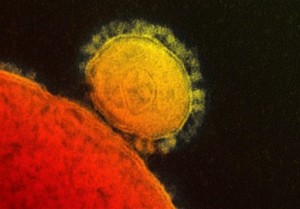MERS unlikely to spread in Asia—WHO expert
MANILA, Philippines — Asian countries should keep their guard against the deadly Middle East respiratory virus, although it is unlikely to spread to the region, a World Health Organization expert said Thursday.
The Middle East respiratory syndrome (MERS) appears to be less infectious than originally thought even though it has already killed 287 people, said Mark Jacobs, WHO’s director for communicable diseases in the Western Pacific.
The relatives of those infected have not been showing any signs of catching it, he added.
His comments come after the Philippines last week urged its large Muslim minority to reconsider plans to join the annual Hajj pilgrimage, which takes place in Saudi Arabia, until the threat from the virus has dissipated.
But Jacobs said the virus posed little regional threat.

This file photo provided by the National Institute for Allergy and Infectious Diseases shows a colorized transmission of the MERS coronavirus that emerged in 2012. AP
“A spread in our part of the world is small,” Jacobs told reporters. “If the virus stays unchanged, then I think that what we have been seeing is what we will keep seeing.”
Article continues after this advertisementThe WHO said 15 countries have reported MERS cases, with the virus widely circulating in the Arabian peninsula.
Article continues after this advertisementOutside the Middle East, both the Philippines and neighbor Malaysia have both reported cases of patients who apparently caught the virus after travelling there.
These people had not infected others in their countries, according to a WHO report.
“We haven’t seen big outbreaks in a community or anything like that to suggest that it’s easy for some in the general community to be infected, (but) obviously we are keeping a close eye on that and hope that would not be the case,” Jacobs said.
While there was always a chance of the virus spreading in health care facilities treating infected patients, “the risk to almost everyone in the world is extremely low.”
Jacobs advised Asians travelling to Saudi Arabia for the Hajj in October to take precautions, including proper hygiene and staying away from people exhibiting symptoms like coughing.
The WHO has not issued any travel or trade restrictions or entry screening related to MERS.
RELATED STORIES
Filipino Muslims urged to abort Mecca trip due to MERS virus
Hajj pilgrims urged to avoid hugs, kisses to prevent MERS-CoV spread